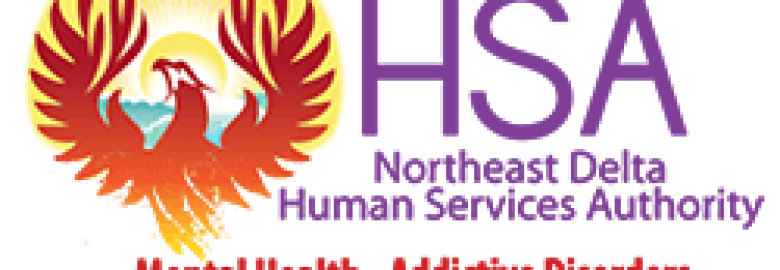
Bastrop Behavioral Health Clinic
NE Delta HSA is dedicated to transforming how we provide vital services to our citizens. We bring innovative programs to our citizens, which include integration of behavioral health with primary care services; services for children and adolescents with behavioral disorders that are at risk for experiencing a psychiatric or behavioral emergency; and collaborations with law enforcement agencies that help first responders know how to recognize mental health issues. We work to break down barriers that keep citizens from obtaining treatment. Our sole purpose is to keep the specific needs of the people in our communities at the forefront of our efforts.
Just as we hold all of our efforts to a high standard, we expect the same effort from our citizens. We must all be accountable for our actions. We must be willing to actively participate in living our most productive lives. We believe that every person we serve possesses the ability to reach their greatest potential.
At the heart of our daily work, we are dedicated to bring even greater access to the crucial services we provide; to nurture an environment of unsurpassed customer service where people are treated with genuine kindness, courtesy and a caring attitude; and we strive to offer competent, quality care that fosters hope, trust and the most beneficial health outcomes to the people we serve.
I hope you find our website to be a useful and valuable resource. Together we can ensure that our clients’ voices and their cries are heard.
Sincerely,

Dr. Monteic A. Sizer
Northeast Delta Human Services Authority
How do I know if I need mental health services?
• You are struggling with mental health issues, or you have received a diagnosis such as depression, bi-polar disorder or anxiety disorder ranging from mild to severe
• You have a substance abuse issue, substance dependence or a severe personality disorder.
• You have one or more mental health disorders that substantially interfere with your ability to carry out the primary aspects of daily living, such as self-care, household management, interpersonal relationships and performance in school or work.
How do I know if I am eligible for mental health services?
• We will assess you and determine if you meet our admission criteria or if you would benefit from our assisting you with some other treatment placement.
• If you are suffering from a mental health illness such as depression, severe mood swings, hallucinations, or emotional problems resulting from a traumatic event
List of Services
Assessment and Referral: Assessments connect clients with appropriate level of care and resources.
On-Call: Individuals experiencing crises after regular business hours can call 318-362-3339 or 1-800-256-2522.
Outpatient Mental Health Counseling: Individuals struggling with behavioral health issues, or have received a diagnosis such as depression, bipolar disorder or anxiety ranging from mild to severe can receive Individual/Group Counseling that includes a number of approaches such as supportive therapy, psychoeducation, and cognitive behavioral therapy.
Medication Management: Individuals who are relatively stable on medication and require minimal interventions may receive medication management, educational services and referral services.
Outpatient Services for Addictive Disorders:
• The Intensive Outpatient Program provides addictive disorder treatment for nine hours per week in a group setting for six weeks
• The Outpatient Program provides addictive disorder treatment for two hours per week for about six weeks
• The Aftercare Program provides one hour per week for an indefinite period of time
• A one-day DWI program for a first offense DWI
Behavioral Health Pharmacy Services: Provides medication for individuals without Medicaid, Medicare, or private insurance who qualify.
Clients can also apply for Medicaid and Supplemental Security Income at the Monroe Clinic. Volunteers Of America has an office here at the clinic and assists patients in filling out any required forms.
What should I bring with me to my first appointment?
For mental health and/or addiction services:
1. An ID card and an insurance card if you have a policy.
2. Any medications you take, in the pill bottle, or a pharmacy print-out of your medications.
3. Proof of income must be established when you arrive. If you don’t have proof of income with you, you have 30 days to bring it back to us.
4. Name and contact information for any agency that referred you to us.
5. Any relevant legal paperwork such as a court order.
Where is the nearest clinic for mental health services?
NEDHSA Monroe Clinic
4800 South Grand St.
Monroe, LA 71202
318-362-3339
Hours of Operation:
Monday – Friday 8:00 a.m. – 4:30 p.m.
(Addiction and Mental Health Clinic)
Driving Directions
NEDHSA Bastrop Clinic
451 E. Madison Avenue.
Bastrop, LA 71220
318-283-0868
Hours of Operation:
Monday – Friday 8:00 a.m. – 4:30 p.m.
(Addiction & Mental Health Clinic)
Driving Directions
NEDHSA Women & Children’s Clinic
3200 Concordia St.
Monroe, LA 71201
318-362-5188
Hours of Operation:
Monday – Friday 8:00 a.m. – 4:30 p.m.
(Developmental Disabilities Application Center and Family Support Unit)
Driving Directions
NEDHSA Ruston Clinic
602 East Georgia Ave.
Ruston, LA 71270
318-251-4125
Hours of Operation:
Monday – Friday 8:00 a.m. – 4:30 p.m.
(Addiction & Mental Health Clinic)
Driving Directions
NEDHSA Columbia Clinic
5159 Hwy 4 East
Columbia, LA 71418
318-649-2333
Hours of Operation:
Monday – Friday 8:00 a.m. – 4:30 p.m.
(Addiction & Mental Health Clinic)
Driving Directions
NEDHSA Tallulah Clinic
1012 Johnson St.
Tallulah, LA 71282
318-574-1713
Hours of Operation:
Monday – Friday 8:00 a.m. – 4:30 p.m.
(Mental Health Clinic)
Driving Directions
NEDHSA Winnsboro Outreach
1301 Landis St.
Winnsboro, LA 71295
318-649-2333 or 318-435-2146
Hours of Operation:
Monday – Friday 8:00 a.m. – 4:30 p.m.
(Mental Health Clinic)
Driving Directions
Addiction Help
How do I know if I need addiction services?
Diagnosing substance abuse or addiction depends on determining more than simply physical symptoms of abuse. Our counselors use a series of both physical and behavioral diagnostic criteria to determine if you have an addiction. These criteria may include:
- Inability to meet your obligations and responsibilities with family, friends or at work
- Relationships with your family or friends are suffering and affected
- Health financial or legal issues occuring due to substance abuse or addiction
- Inability to cease using a substance or inability to stop participating in an unhealthy activity
- Physical tolerance to a substance
- Occurence of withdrawl symptoms when a substance or activity is dropped
- Using a substance more than intended (substance is taken in larger amounts over a larger amount of time than intended)
- A great deal of time is spent trying to obtain a substance, use it or recover from its effects
- Important social, occupational or recreational activities are given up or reduced because of the use
- Continued use despite physical or psychological problems exacerbated by the use of a substance
- Recurrent substance abuse use in situations that are physically hazardous
- Legal problems because of use
- If you think you may have a substance abuse issue, dependence or personality disorder
How do I know if I am eligible for addiction services?
- If you think you have a substance addiction/abuse problem we will assess you and determine if you meet our admission criteria or determine if you would benefit from our assisting you with some other treatment placement.
Programs, Services and Treatment
If you think that you or a family member has a substance abuse or addiction issue, you can come into one of our clinics and talk with someone who will listen. We will help you determine a treatment path that best meets your needs. We will recommend the level of care and curriculum that provides you with the support you need to be successful. A level of care refers to the depth of your treatment needs. A curriculum ensures that your treatment plan is thorough and follows a schedule from an initial diagnosis through a recovery path and follow-up.
Individuals and families will be assisted by the appropriate behavioral health professionals, which may include addiction counselors, physicians, social workers, family therapists and case managers. These professionals will work with you to provide the comprehensive health services you need.
List of Services
- An Assessment, which provides a comprehensive evaluation of your needs, assessing problem areas including family, legal, medical, social, psychological, financial and addiction
- Outpatient Substance Abuse Treatment
- Intensive or Outpatient Substance Abuse Treatment
- Referral to Outpatient Individual Mental Health Counseling if needed
- Referral to Outpatient Psychiatric Services withing the clinic
- Referral to pharmacy and medication management within the clinic
- Substance Abuse Education and court mandated classes
- Referrals to primary care medical services
- We serve as a Medicaid Application Center and a Voter Registration Center
- We partner with a gambling addiction service provider
- Prevention services
- Outpatient substance abuse individual and group counseling
- Intensive outpatient substance abuse group counseling
Peer Support services
- Adolescent Substance Abuse Program (ASAP)
- Operation/Cooperation with Counselors, Adolescents, Parents and Probation Officers (CAPP)
- Child Adolescent Response Team (CART)
- The Women’s Gender-Specific Intensive Outpatient Treatment Program (WOSAP)
- Women’s Gender Specific Continuing Care Program
Evidence-based curricula we utilize for our clients:
Evidence-based treatment is defined as the conscientious and judicious use of current best practices, research and evidence in making decisions about the care of the individual patients. Our clinicians integrate this research with their clinical expertise and with their patients’ values and expectations.
An evidence-based approach also recognizes that many aspects of health care depend on individual factors, such as variations in individual physiology. Application of available evidence is dependent on patient circumstances and preferences and is subject to input from personal, religious, ethnic and economic values. The evidence-based services we use include:
- Rational Living Therapy – Comprehensive, cognitive-based behavioral psychotherapy that emphasizes long-term results
- Cognitive Behavioral Therapy – Focuses on examining the relationships between thoughts, feelings and behavior. Problem and goal-directed
- The Matrix Model – Integrated treatment through a cognitive and behavioral approach with a motivational interviewing style; supplemented with contingency management
- Motivational Interviewing – Therapeutic technique designed to engage resistant or ambivalent individuals by encouraging “change” talk and decreasing resistance to the idea of reducing substance use or an addictive behavior
- Living in Balance – Research-based, flexible and practical substance abuse treatment curriculum that helps clients address issues in lifestyle areas that may have been neglected during addiction.
We strive to consistently provide our citizens with:
- Greater access to services
- Excellent customer service
- Quality, competent care
What should I bring with me to my first appointment?
For mental health and/or addiction services:
1. An ID card and an insurance card if you have a policy.
2. Any medications you take, in the pill bottle, or a pharmacy print-out of your medications.
3. Proof of income must be established when you arrive. If you don’t have proof of income with you, you have 30 days to bring it back to us.
4. Name and contact information for any agency that referred you to us.
5. Any relevant legal paperwork such as a court order.

